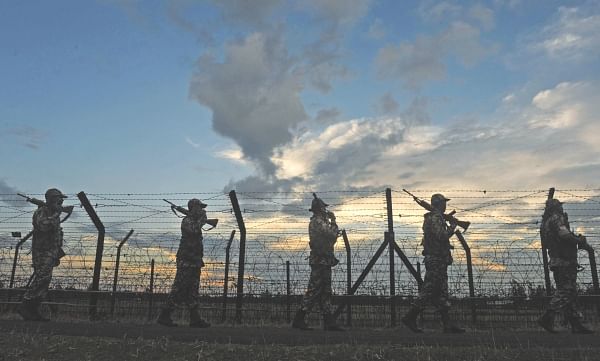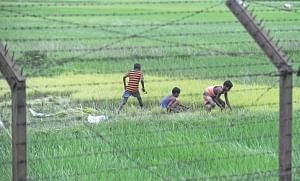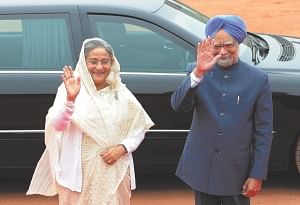| Home - Back Issues - The Team - Contact Us |
 |
| Volume 11 |Issue 05| February 03, 2012 | |
|
|
Neighbours
Outbordered Sharmin Ahmed The famous American poet, Robert Frost, once said, “Good fences make good neighbours.” Given the fact that our borders are becoming very dangerous as our nearest neighbour, sharing two-thirds of our borders, has taken a very hostile stance, it becomes a seminal question to ask: what can be done to make our borders friendlier? On December 9, 2011, a 22-year-old Bangladeshi named Habibur Rahman, who was involved in cattle smuggling, was caught by the allegelly Indian Border Security Force (BSF). Eight of their men stripped, kicked, and mercilessly beat him up because he refused to bribe them or did not bribe them enough. The BSF men demanded Rs 1,000, a mobile phone, and a torch from him as bribe. As Habibur didn't have any of these, two jawans stripped him naked, tied his hands and legs and beat him up with a stick before dumping his unconscious body in a mustard field near Raninagar camp in Paschimbanga's Murshidabad district.
The indifference shown by our government high-ups regarding this issue is not only shocking but also very disappointing. Our LGRD minister Syed Ashraful Islam remarked: “Cattle lifting, drug smuggling and many other crimes have been taking place in the border areas. This has happened in the past, is happening now and will happen in the future.” Does that mean such brutality is justified? The eight jawans of BSF were suspended by the BSF after it came under their notice through the video footages of the event broadcast by Indian channels. Opposition BNP standing committee member M K Anwar says, "The government has to speak-up to India, and they have the right to. But they think that nothing wrong is being done with their own people and this is very sad. The choice to remain quiet is a wrong policy and they need to rethink their policy." Suspending officers who are responsible is not a sustainable solution to border atrocities. Professor Imtiaz Ahmed, of the Department of International Relations Dhaka University says, "Since this issue arose due to cattle smuggling, and India has a ban on export of live animals, the government of Bangladesh has to work on how to address the case of livestock smuggling. They should ask for answers regarding why India cannot address their policies on preventing cattle smuggling. It is banned to slaughter cattle except in particular areas in India. This makes it necessary for the bringing of cattle alive into Bangladesh. And then they put in the live animals export ban; how else will the cattle come to Bangladesh?" He explains that the Government should ask our neighbours to come up with a logical policy. These issues have been raised time and again, but they dismissed it on the grounds that BJP will always be strongly against it. So such matters are very politically difficult to solve. Nonetheless, if India continues to claim to be a secular country, they need to explain the basis of such policies. This is not the first case of BSF brutality; many still cringe remembering the incident of fifteen-year-old Felani who travelled all the way from Assam to reach the Kurigram border, but failed to cross it. She was shot by border guards on January 7, 2011 and was left hanging on the 4,000-kilometre-long, ten-foot-high barbed-wired and concrete fence made at a cost of $1.2 billion to stop what they said mass migration, smuggling and infiltration. From 6 am to 11 am her body hung, only to be handed over to the Border Guards Bangladesh (BGB) at noon the day after. After that the BGB dusted their hands off the incident by providing Tk. 3 lakh compensation to her family. A total of 74 persons were killed by BSF solders on the borders in 2010, 96 in 2009, 62 in 2008 and 120 in 2007. Most of them were innocent and unarmed civilians like Felani, according to Odhikar, a Dhaka-based human rights organisation. Delhi had promised 'no more deaths on the border' in March 2011. But this did not stop the barbaric torture of Bangladeshi civilians. Obviously bribery (on both sides of the border) is a major factor in these human rights violations. Both countries, especially India, have to take stringent measures to make sure their border guards cannot take bribes and get away with it. MK Anwar suggests, "The case of such atrocities by the BSF on our countrymen is not new, we have heard of it many times. The government, which is the representative of the country, has to make strong protest against these things and do so by taking it to the appropriate forum." The joint general secretary of ruling Awami League, Mahbubul Alam Hanif says, "In order to ensure a safe and friendly border, there needs to be a bilateral discussion on both sides of the border. Obviously one side alone cannot solve this issue. Also the local politicians, civil society and all citizens must actively work to spread awareness about the consequences of illegal border crossing." He further explains that if these illegal acts can be prevented, our borders will be 'friendly' and there will be no need to point fingers at each other. It seems to be a Herculean task trying to answer our perennial border issue question. But the point is – an answer must be found and this has to be done in consensus with our neighbours. *a blogger Frank Domenico Cipriani wrote on account of the Felani killing; The Killing of 15-year-old Felani Mahatma, help me make some sense On the wire, mournful cries I hear a father's cry of grief Our tears and rage won't make us blind At least we know each precious soul Descendants of the dead who fell Copyright
(R) thedailystar.net 2012 |
||||||||


